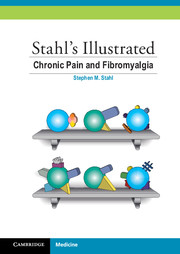Chapter 1 - Pain Affects Us All
Published online by Cambridge University Press: 19 October 2021
Summary
Nearly 80% of all visits to the physician involve at least one complaint about pain. Symptoms of pain account for some of the greatest suffering and are among the costliest of any medical condition. Not only do patients in pain experience significant lifestyle sacrifices, but the prevalence of pain is also costly to society as a whole. The early detection of pain disorders and the application of appropriate treatment and care can lead to the improvement of quality of life and the reduction of social impact. This book focuses on chronic pain disorders that can often be treated with non-opiate pharmacologic approaches. This can be a great benefit to overall management of pain, as it eliminates many of the problems associated with chronic opioid use such as addiction, tolerance, and reduction of efficacy of other drugs like antidepressants.
This book describes neuropathic pain disorders and the existing clinical methods for treating them. The holistic perspective presented here is appropriate for primary care physicians and other clinicians who are likely to have patients presenting early in the course of chronic pain disorders. This book does not cover procedures or management of pain late in the course of illness or for end-of-life care. Chapter 1 explains the biopsychosocial impact of pain and the present state of pain care. The remaining chapters seek to empower and update the reader with strategies to fill the needs presented in the first chapter.
Under-treatment and inappropriate treatment of pain have been attributed to lack of physician knowledge, as well as the illusive nature of pain disorders.
- Type
- Chapter
- Information
- Stahl's Illustrated Chronic Pain and Fibromyalgia , pp. 1 - 10Publisher: Cambridge University PressPrint publication year: 2009

